1. The Parade Was a Must-See Event
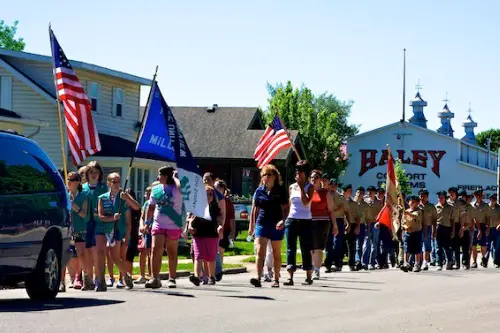
Every small town parade was a sight to behold. It wasn’t just about the floats and the marching bands, but the sense of excitement that filled the air. The fire trucks, sometimes retro and sometimes squeaky new, would blare their sirens as they paraded down the main street. The local marching bands, composed of teenagers, proudly played their tunes while families waved enthusiastically from the sidewalks. The highlight of the parade, however, was always the candy-throwing. Tootsie Rolls, Jolly Ranchers, and handfuls of other candies rained down from the floats, and every child knew where to stand for the best haul.
The atmosphere around parades was unlike anything else in a small town. You’d run into people you hadn’t seen in ages, and everyone would catch up on what had been happening. Parents would let their kids run wild, knowing the whole town was watching, and the local businesses would have booths set up selling everything from snow cones to handmade jewelry. The parade wasn’t just an event; it was the social glue that held the town together. It was an experience everyone looked forward to, eagerly anticipating each year. Even as you got older, the nostalgia of those candy-filled afternoons never left you.
2. Friday Nights Were for High School Football
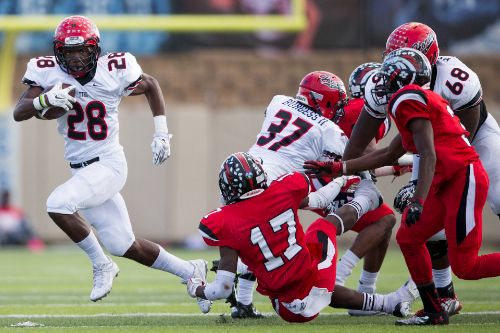
Friday night football games were more than just a school event—they were the highlight of the week. It didn’t matter if you had graduated years ago or didn’t care for the sport, you were there, under the lights, cheering on the home team. The stadium lights seemed to shine just a little brighter on Fridays, lighting up the faces of the entire community. Everyone from kids in elementary school to retirees filled the stands, bundled up in the town’s colors, showing support for the team.
For those who were directly involved, it was a chance to be part of something bigger than themselves. Whether you were a player, a member of the cheerleading squad, or volunteering at the snack bar, there was a sense of belonging. The atmosphere was one of camaraderie, where high school rivalries turned into lifelong friendships, and where the whole town would stand together, proud of their shared identity. The chants, the crowds, the halftime shows—these were moments that defined small-town culture, and they lived on in the hearts of everyone who was lucky enough to be part of them.
3. Directions Include Landmarks, Not Street Names
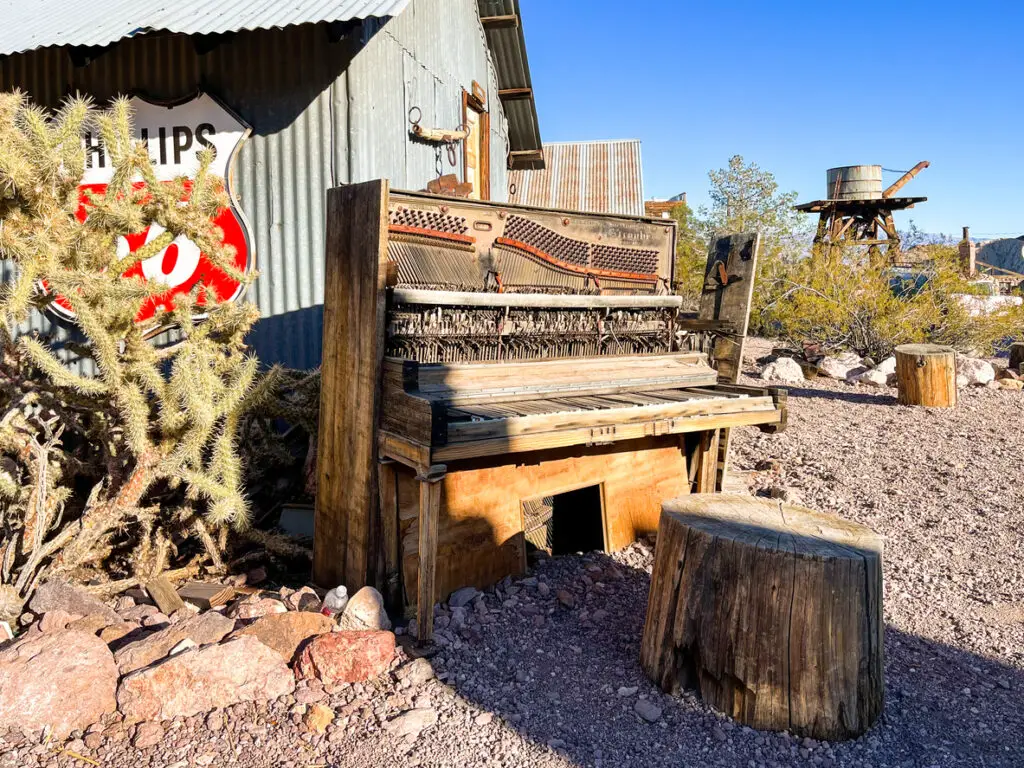
In a small town, directions were more about the landmarks than the street names. The instructions would often sound like a treasure hunt: “Turn left at the old gas station, then take a right when you see the big red barn.” Sure, street names existed, but they were usually reserved for formal situations or forgotten altogether. Navigating your way around town didn’t require an atlas or a GPS, just a memory of the landmarks that had been around for generations.
The reliance on these local landmarks created a sense of nostalgia and personal connection to the town. Everyone had their favorite place to reference, whether it was the abandoned church on the corner or the spot by the creek where you used to hang out as kids. These directions told a story, each one marking the passage of time and memories attached to specific locations. It was almost as if the town itself was a giant living map, and the most important landmarks weren’t just physical—they were emotional markers, tying people to their roots.
4. The One Stoplight Was a Big Deal
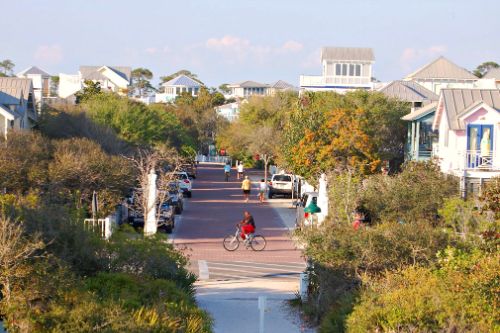
When your town finally got a stoplight, it felt like a monumental achievement. Before that, traffic had to navigate the four-way stop, where everyone seemed to hold their breath as they tried to figure out who would go next. But when that stoplight went up—oh, it was a game-changer. Not only did it add an air of sophistication to the town, but it also stirred up endless debates. Some people couldn’t understand why they needed one, while others were thrilled at the thought of having a little extra traffic control.
If you were lucky enough to have a stoplight, it became the unofficial marker of the town’s progress. People would joke about how the traffic backed up at that intersection during rush hour, but they all secretly reveled in the fact that the town had entered the modern era. In towns without a stoplight, there was a certain pride in making do with a four-way stop, where the interactions between drivers felt a little more personal and cooperative. No matter where you lived, though, the stoplight—or lack of it—was a symbol of the town’s unique identity.
5. Everyone Had a “Tab” Somewhere
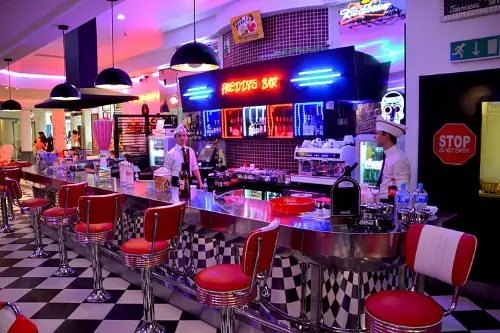
In many small towns, running a tab at the local diner, gas station, or general store was as commonplace as paying cash anywhere else. There was a unique trust between business owners and their customers, built on years of knowing each other’s families. Whether it was for a quick sandwich at lunch or filling up the gas tank, you could just tell the cashier to “put it on the tab.” At the end of the month, you’d pay off your tab, and if you forgot, you could always count on a friendly reminder when you walked in next time.
Having a tab wasn’t just about convenience; it was a reflection of the small-town values that prioritized relationships over transactions. The storeowner or diner waitress knew your kids’ names and asked about your mom’s health without needing to be reminded. Settling up wasn’t a big deal—it was just part of the rhythm of life. It was a reminder that in a small town, even the most mundane transactions were wrapped in the comfort of familiarity and trust.
6. Snow Days Were an All-Or-Nothing Deal

Snow days in a small town were something special—either you had them, or you didn’t. The decision to cancel school was usually made by someone with a personal connection to everyone in town. If the forecast called for a few flakes, it could feel like a holiday was coming. The anticipation of a snow day, especially for kids, was almost palpable. You’d go to bed with your fingers crossed, hoping for that early morning call or the announcement on the local radio station that school was canceled.
On the other hand, if the snow wasn’t quite bad enough, you’d get the infamous “we’re tough, we’re not canceling school” speech. The decision-making process often felt like it was happening just for you. It could be incredibly frustrating to see your city friends getting snowed in while you were trudging to school in the snowdrifts. Regardless of the outcome, snow days carried a magical quality to them. Whether you got the day off or not, the excitement and anticipation made every winter feel unique.
7. There Was Always a “Town Character”
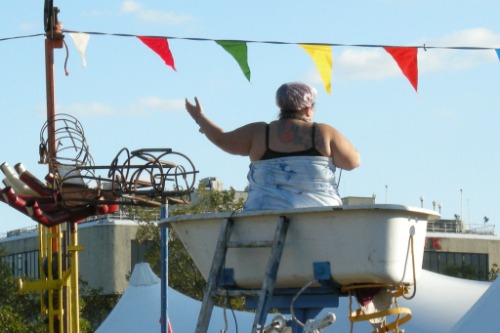
Every small town had that one person who everyone knew. They didn’t have to be famous, but they were well-known for their personality, quirks, or actions. Maybe it was the elderly man who wore a cowboy hat year-round and rode his bike to the local diner, or the woman who lived down by the lake and kept a collection of hundreds of garden gnomes in her yard. These characters weren’t just eccentric—they were beloved, adding color and personality to the town’s fabric.
They also provided a sense of continuity. Whether they were the unofficial town historian or simply a person with an endless supply of local gossip, town characters had a way of bringing the community together. They were the subjects of stories that would be passed down for generations, always reminding people of the time when the town was just a little bit more quirky and a lot more interesting. Everyone in town had a memory or a story about them, and they were often the ones who kept the town’s history alive in a way that official records never could.
8. Gossip Spread Faster Than Wi-Fi

In a small town, gossip spread like wildfire—and it didn’t need the internet to fuel it. The old-fashioned grapevine was the real powerhouse of communication. News would travel from one person to the next, sometimes faster than you could even process it yourself. The beauty of it was that it was almost always exaggerated, making it more entertaining than accurate. By the time a piece of news reached its final destination, it might have morphed into a completely different story.
The speed at which gossip spread could be both thrilling and terrifying. It didn’t take much to get people talking—whether it was a new couple in town or a minor accident, everyone had their opinion. And because the town was so small, everyone seemed to know everyone’s business, making it nearly impossible to keep anything private. Sometimes, it was almost comforting to know that no matter where you went, someone would always be aware of what was going on in your life. At other times, it could feel like living in a fishbowl, but one thing was certain: small-town gossip had an unmatched speed and reach.
9. Your Teachers Knew Your Parents (And Your Grandparents)
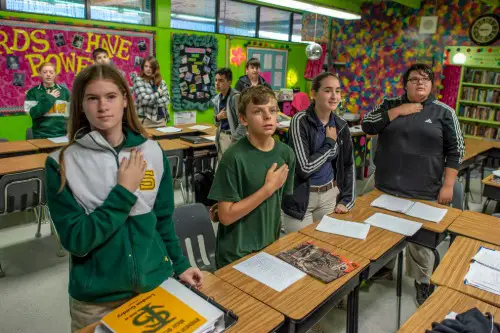
In a small town, the line between school and home was often blurry. Your teachers weren’t just educators—they were a part of the community, and they knew your family well. At parent-teacher conferences, it wasn’t just a time to discuss your grades. It was a chance for the teacher to swap stories with your parents about when your older sibling was in school or how your grandma had once been their favorite student. There was no hiding, and you quickly learned that your behavior at school would be talked about over dinner at home.
This close-knit connection between educators and families often made school feel more like a family affair. Teachers would give you extra attention because they knew your backstory, or they would cut you some slack, knowing what was going on at home. There was no anonymity in school; everyone knew who you were and where you came from. That could be comforting, but it also made it difficult to get away with anything. If you caused trouble, you could count on hearing about it before you even got home.
10. The Local Newspaper Covered Everything

In a small town, the local newspaper wasn’t just for national headlines. It covered everything—little league scores, community potlucks, and even the annual quilt show. When something made it into the paper, it felt like an official stamp of approval. You could bet that your grandma clipped out the article and proudly displayed it on the fridge, no matter how small the mention.
The local newspaper was a reflection of the town itself—everything from birth announcements to obituaries, all in one place. It was a source of pride for many families, who could say their lives were a part of the town’s collective history. And if you ever saw your name or face in the paper, you knew it was a big deal. Whether it was for a school award or a chance encounter with the mayor, being featured in the local paper meant you were a part of something larger than yourself. The paper wasn’t just a source of news—it was the town’s unofficial scrapbook.
11. Chain Stores Were a Milestone

When a chain store like Walmart or McDonald’s opened in your small town, it was a game-changer. It wasn’t just about convenience; it was a symbol that the town had arrived. These national retailers represented progress, modernity, and even a little bit of pride. The grand opening would be a big event, and everyone would have something to say about whether it would change the town for better or worse.
For some, the arrival of chain stores felt like a sign of things getting too commercial, like the town was losing its small-town charm. Others were thrilled to finally have access to goods and services that had once required a trip to the nearest city. Whatever your opinion, the arrival of chain stores meant that your town was evolving, even if it wasn’t always for the better. Whether you loved it or hated it, the change was inevitable, and everyone had an opinion on how it would affect the town’s identity.
12. Your First Job Was a Community Rite of Passage
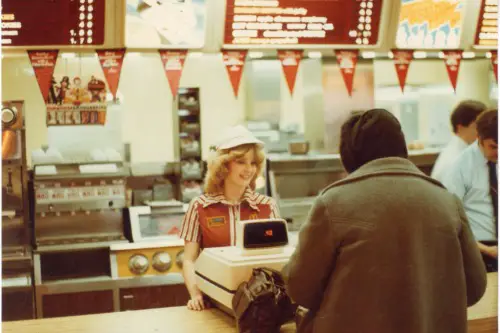
In a small town, your first job often came from someone who knew your family well. Whether it was bagging groceries at the local grocery store, babysitting for a neighbor, or mowing lawns for an elderly couple down the street, your first job was as much about learning the value of hard work as it was about connecting with the community. These jobs often came with a sense of responsibility—after all, your employers were friends or relatives, and they wouldn’t hesitate to tell your mom if you were slacking off.
Getting your first paycheck was a rite of passage, and spending it at the local store or diner made you feel like you were contributing to something bigger. It wasn’t just about the money—it was about becoming part of the community in a new way. Everyone knew who you were, and your work ethic became a reflection of your family’s values. Whether you were saving up for something special or just spending a little extra pocket money, your first job was a key part of growing up in a small town.
13. The Fair Was the Highlight of the Year
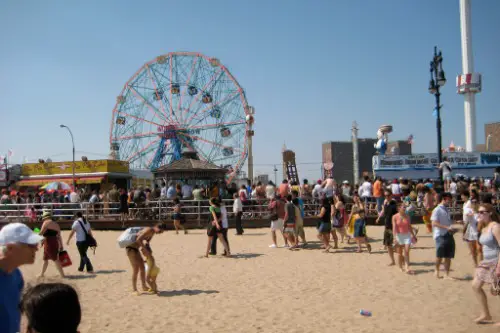
County fairs were the social event of the year. They were a chance for the whole town to come together, enjoy some food, and take part in various competitions. From the deep-fried everything to the questionable carnival rides that seemed to wobble a little more than you’d like, the fair was an experience like no other. People would spend the entire day at the fairgrounds, visiting friends, eating, and watching the livestock judging.
For some, the fair was about more than just the rides and food—it was a chance to show off their skills. Whether it was entering a pie-baking contest or exhibiting the prized chicken you’d been raising all year, there was a competitive element that added to the excitement. The fair was also a place where memories were made. From first kisses under the Ferris wheel to embarrassing moments in the petting zoo, the fair was a part of growing up. It was an event that no one missed, and everyone had stories to tell about it.
14. You Gave Directions by Saying “It’s 20 Minutes Away”

In a small town, distance was rarely measured in miles. Instead, people gauged how far away something was by how long it took to get there. “It’s about 20 minutes away” or “just a few minutes past the old mill” were more common responses than giving an exact address or distance. It was a practical way to get around, especially in places where landmarks, not street signs, did the trick.
These directions were both an art and a science, shaped by experience and intuition. Accuracy was often flexible, depending on who was giving the directions. It wasn’t about being precise—it was about sharing a sense of the town’s rhythm and flow. And for those who grew up in small towns, it was second nature to navigate in this way.
15. You Could Leave Your Car Unlocked Without Worry
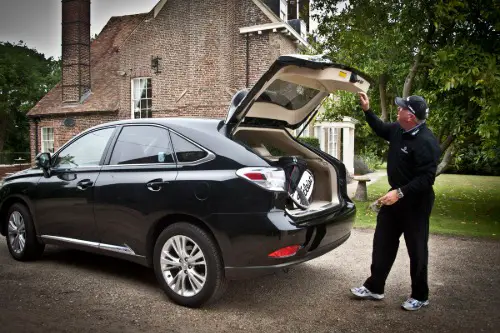
In a small town, leaving your car unlocked wasn’t something you’d think twice about—it was just part of the daily routine. You didn’t need to worry about locking the doors when you went to the grocery store or ran into a friend’s house. Everyone knew everyone else, and the trust within the community was palpable. People didn’t steal; they took care of each other’s property like it was their own. The idea of a stranger walking up and swiping anything from your car seemed almost foreign.
This level of trust extended beyond just vehicles. It was common for people to leave their front doors unlocked when they stepped out for a while, confident that nothing would be taken. The small-town way of life created a bubble of security that felt impenetrable, even if the town itself had its fair share of crime. There was a sense of solidarity and safety that came with the shared knowledge that everyone watched out for each other. It was a different kind of community—a place where you could leave your car keys in the ignition without a second thought and expect everything to still be there when you returned.
16. You Know Everyone’s Business (And They Know Yours)

Privacy? Not in a small town. If you grew up in one, you knew that your every move—whether it was picking up groceries, walking to work, or driving to the next town over—was somehow public knowledge. The grocery store cashier would ask how your mom was doing, and the postman would comment on the new car you bought, even though you hadn’t shared it with anyone. It wasn’t so much gossip as it was the town’s constant pulse, where everyone was interconnected in ways that were impossible to ignore.
The sense of community was both a comfort and an occasional frustration. It meant that you could rely on your neighbors in times of need, but it also meant that nothing stayed private for long. If you had a new job or were dating someone, everyone would know about it, often before you had a chance to tell your best friend. But this wasn’t a bad thing—it was simply the rhythm of small-town life. People cared about each other’s lives because they were all part of one big, ever-watchful family. You might not always want to be in the spotlight, but you could be certain that someone was always there to support you when you needed it.
17. Moving Away Was Both Exciting and Bittersweet

Leaving your small town for the first time felt like stepping into a whole new world. Whether it was to attend college, start a new job, or chase a dream in a bigger city, the excitement of the unknown was overwhelming. But it wasn’t without its bittersweet moments. Saying goodbye to the places that had shaped your childhood, like the old diner where everyone knew your name or the field where you learned to ride your bike, was harder than you anticipated. There was a feeling of loss, as though you were leaving a part of yourself behind.
Yet, even as you embraced the adventure of city life or life elsewhere, there was always a part of you that longed for the familiarity of home. The quiet streets, the slower pace, and the knowledge that everyone around you shared the same history were things you couldn’t replace. Small-town life had a rhythm that was both comforting and stifling, and once you left, you often found yourself looking back. Sometimes, it took years before you fully realized how much your small-town upbringing had shaped who you were and how it had given you a deep sense of belonging to a place and people that would always be home, no matter where life took you.
Small-town life has its unique charms and quirks—some endearing, some exasperating—but if you can relate to this list, you’ve got a special connection to a way of life that’s all its own.


